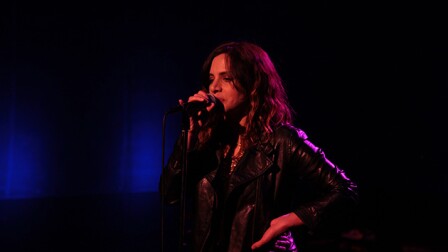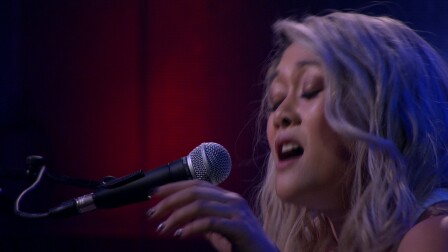
Jenny Lewis: Finding Her Way
Watch the singer-songwriter's full performance on KCET-TV. Click here for future air dates.
In the video for "Just One of the Guys," from Jenny Lewis's recent album, The Voyager, the singer-songwriter is joined by an all-female band. Among the members are actors Kristen Stewart and Anne Hathaway. It's in a way influenced by the women in Robert Palmer's hit videos of the 1980s, where chic women dressed to the nines wielded instruments with cool expressions on their faces. Lewis' video bandmates are equally chic, although standing barefoot in pantsuits as opposed to the high-heels and tight dresses of Palmer's gang.
"We definitely flipped it," says Lewis in her recent visit to Studio A of the scenarios set in her video, "but that was something in the back of my mind." In addition to the pantsuits, the women occasionally appear in drag, sporting mustaches and tracksuits as they emphasize the title, and much of the content, of the song. "I wanted them clothed, I wanted them in suits," Lewis explains. "I wanted them barefoot and grounded." She adds, "I wanted to give everyone the freedom to present their female character and their male character."
"Just One of the Guys" delves into the experiences and expectations of women in male-dominated groups, or maybe just of women in general. Lewis sings, "No matter how hard I try/To be just one of the guys/There's a little something inside that won't let me." By the song's bridge, Lewis drops the bombshell, "There's only one difference between you and me/When I look at myself, all I can see/I'm just another lady without a baby."

It's a quick commentary on a society where a woman's accomplishments are often superseded by her mom-status. "I think it's something that you think about when you're a women, period," says Lewis. "It's something that I wanted to discuss," she adds. "I don't know if it had ever been talked about in that way in a song before."
Lewis stresses that the sentiments in the song are presented in a casual way too. "It's just an acknowledgement of how it is." Still, her attitude, and the mere fact that she brought this up in song, is positive and encouraging women to live their lives the way see fit. "I don't have children and that's cool for now and, maybe I will, and that will be fine too," says Lewis. "It's okay to make that choice for yourself."
The former Rilo Kiley frontwoman contemplates the particular challenges that female musicians face, including press interviews. "I think we wouldn't be having this conversation if I were a man," she says and she has a point. Lewis, who is in her late 30s and has been an indie rock star since the turn of the 21st century, still has a lot of music to make. "I feel like I am just getting started," she says, "but I think people write me off because I am knocking on 40, but, it's ridiculous. It's totally absurd that dudes don't have to answer these same questions."
Lewis grew up in Van Nuys and says that has been a "reference point" for her songwriting. "That's where I watched the L.A. riots on television when I was a teenager," she says. "That's where I bought my first hip-hop record at the music shop down the street. That's where I had my first kiss." While she was in between records and going through "personal struggles," Lewis headed back to her old neighborhood for drives and a chance to reflect upon her life. "It sort of helped me remember where I came from and how far I have come since then," she says.
One of Lewis' earliest influences was hip-hop. She was 10 years old when her friend, the late actor Corey Haim, gave her a tape. "This was my introduction to hip-hop, which began my love and obsession with words and poetry," she says, who was 13 when she started writing her own songs. "I took what I could from those records. I got an acoustic guitar and wrote a bunch of raps over the chords to Desperado, which were the first chords that I learned."

Lewis connected to the albums. "I was a suburban kid from the Valley, some of the things within the NWA records I was listening to, I couldn't exactly relate," she says, "but it was my music." Unlike the records in her mom's collection, these were the ones the records of her own generation. "It sparked something in me," she says. "It made me realize I had something to say." She mentions that she tried to freestyle once at a Hollywood club where Biz Markie was. "I thought this is the beginning and the end of my hip-hop career and I stuck to the acoustic guitar," she says.
For Lewis, indie rock became the place where she could develop her voice as a singer, songwriter and musician. "It was low-key enough where I could start a band with my friend and write songs and play in basements," she says. "It seemed very accessible, that kind of music. Anyone can play indie rock. It's for anyone."
For The Voyager, Lewis mashes together the autobiographical with the fictional. "I have always written about myself, but I have always enjoyed created characters as well," she says. "Oftentimes, people think those characters are ripped from the pages of my diary which I don't have."
She continues, "Certainly the feelings come from me but some of the characters are completely made up. That gives me a little freedom as a writer to explore that I would not necessarily relate back to my own life."
There are, at times, heartbreaking narratives on "The Voyager," but it's not all melancholy, particularly on the title track, which closes the album. "The song sort of ends up out in the cosmos in a way," she says. "Despite the struggles in the song, it is very positive and almost mystical at the end of the record, but, throughout, I am a voyager. I am on a path and I am able to write about it when I can."











